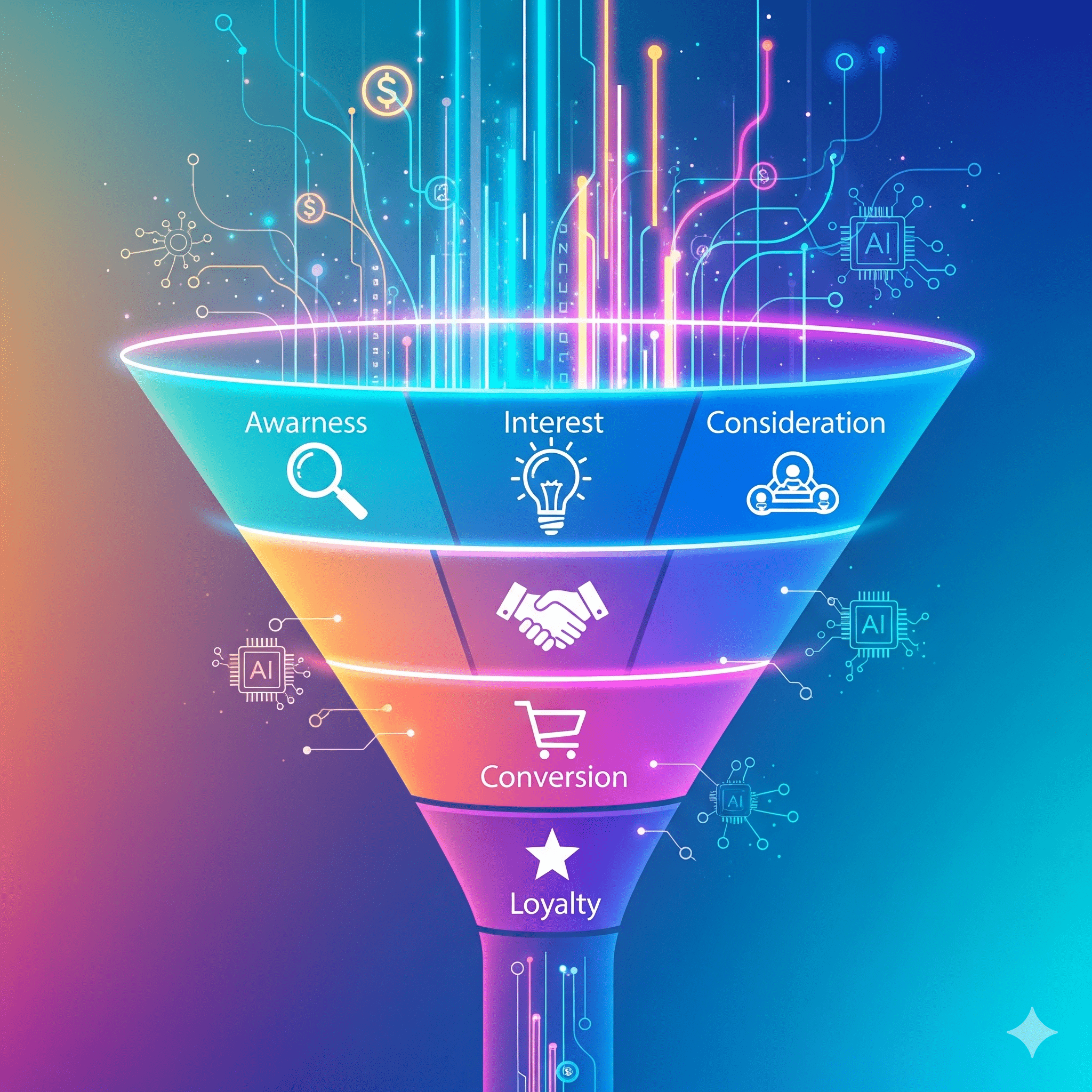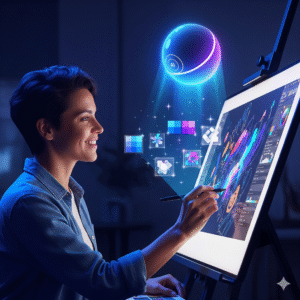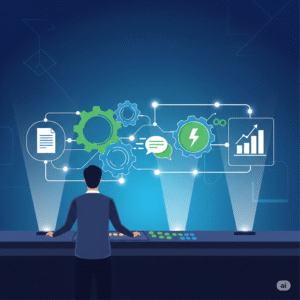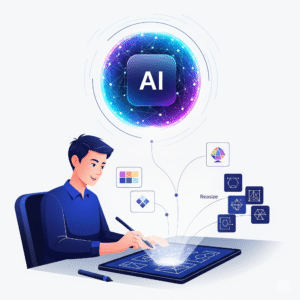Think about the last time you bought something online. Maybe you saw an ad for a new product, clicked on it, read a few reviews, and then finally made a purchase. This journey, from first seeing an ad to becoming a customer, is called the marketing funnel. For years, marketers tried to guess what a customer wanted at each step. This was a lot of guesswork. But now, AI in marketing funnel is changing all of that.
AI is like a super-smart assistant. It can watch what millions of people do online. It learns what they like, what they read, and what they buy. This allows it to make very accurate guesses. It can then help a business send the right message to the right person at the right time. This is a game-changer for marketing. It turns guesswork into a science.
This article is your guide to understanding how AI is changing the customer journey. We’ll explore how it helps at each stage of the funnel. You’ll also learn about real companies using these tools. We’ll also give you some simple tips to start using AI yourself. By the end, you will understand why AI for sales and marketing is no longer a luxury, but a necessity.
Top of the Funnel: Attracting New People with AI (AI in marketing funnel)
The top of the marketing funnel is all about getting people to notice you. This is the “awareness” stage. In the past, marketers would spend a lot of money on big ad campaigns. They would hope that a few people would see the ad and get interested. This was like throwing a lot of darts at a board and hoping one would hit.
AI in marketing funnel changes this. AI can help marketers find the perfect people for their ads. It looks at what people are searching for online. It can also understand what they are interested in. This helps the AI show the right ad to the right person. This is called targeted advertising. It is much more effective than showing the same ad to everyone.
For example, a company that sells running shoes can use AI to find people who have recently searched for “marathon training tips” or “best running apps.” Then, it can show them an ad for its new running shoes. This is a much smarter way to advertise. It helps companies save money and get better results. A case study with VodafoneZiggo showed a 40% growth in conversions by using an AI-powered keyword tool to find new customers who were searching for related terms.
Middle of the Funnel: Building Relationships with AI
Once a person is interested in your business, they move to the middle of the funnel. This is the “consideration” stage. In this stage, people are learning about your product. They are comparing it to other products. Your job here is to give them more information. You also need to show them why your product is the best.
This is where AI for customer journey becomes very useful. It helps you send personalized content to each person. A person who reads a blog post about one of your products might receive an email with more information about that product. Another person who visits your pricing page might get an email with a special offer. An AI can also power a chatbot that answers a person’s questions instantly, making them feel heard. It’s like having a personal assistant for every single person who is interested in your business.
This personalization is very important. According to McKinsey & Company, 71% of consumers expect companies to deliver personalized interactions. When they don’t get them, 76% of people get frustrated. This is why AI personalization marketing is so important. It helps you build a strong relationship with each potential customer.
Bottom of the Funnel: Closing the Deal with AI *
The bottom of the funnel is the “conversion” stage. This is where a person decides to become a customer. Your goal here is to make the buying process as easy as possible. You also need to make sure they feel confident about their purchase.
AI can help here in many ways. It can:
- Predict what a person will buy: An AI can look at a person’s browsing history and suggest a product that they are likely to buy. This is what Amazon does. This is a very effective way to increase sales.
- Send personalized offers: The AI can send a person a special offer. For example, if a person has a product in their cart for a long time, the AI can send them an email with a small discount. This might be just the push they need to make a purchase.
- Make the buying process easy: AI can make the checkout process faster. It can also help a person with any last-minute questions they might have.
This use of AI for sales and marketing makes the buying process smoother. It helps increase sales. Most importantly, it makes the customer happy.
Real-World Examples of AI in the Customer Journey
Many of the world’s most successful companies are using AI to make their customer journeys better. These examples show how AI is a powerful tool for marketing.
Case Study 1: Netflix’s Recommendation Engine
Netflix is a master of personalization. Their AI recommendation engine is a big reason why. It looks at what you watch, what you search for, and what you rate. It then uses all of that information to suggest new shows and movies. This is not just a guess. The AI is so smart that it drives up to 80% of the content streamed on the platform. This is a perfect example of AI personalization marketing. It makes the user feel like the platform was made just for them.
Case Study 2: Starbucks’ Predictive Ordering
Starbucks uses an AI engine called Deep Brew. This engine helps them create a personalized experience for every customer. It looks at your past purchases. It also looks at the weather, the time of day, and your location. If it is a cold day, the app might suggest a hot coffee. If it is a hot day, it might suggest a cold drink. It can also offer you a special deal on your favorite drink. This makes the customer feel special. It also increases sales.
Case Study 3: Sephora’s AI Chatbot
Sephora, a beauty retailer, uses a chatbot on its website. The chatbot is like a personal beauty advisor. It can ask you about your skin type and your favorite colors. Then it can suggest the perfect products for you. This helps a person feel like they are getting personal help. It also helps the company sell more products. The chatbot can also answer questions 24/7. This is a great example of using AI for customer journey to improve the customer experience.
Top Tools for a Smarter Marketing Funnel (AI in marketing funnel)
There are a lot of great tools out there that can help you use AI in your marketing. Many of these tools have a free version or a free trial. This means you can try them out to see if they are a good fit for you.
- HubSpot: If you are already using HubSpot, you can use its built-in AI tools. The AI can help you write emails and create social media posts. It can also help you with your content strategy. [See source](https://www.hubspot.com/products/marketing).
- Narrato: This platform is a complete content operating system. It helps with everything from planning to writing. Its AI can create briefs and first drafts. It also has a built-in content calendar to keep everything organized.
- Jasper: This is a very popular AI writing assistant. It’s great for creating content. It also helps you write in your unique brand voice. This is a very useful tool for any marketer.
- AdRoll: This tool uses AI to help you with your ads. It helps you decide who to show your ads to. It also helps you decide how much to spend on your ads. This helps you get better results from your ad campaigns.
These tools are great for building an efficient AI for sales and marketing workflow.
The Future of Marketing: AI and Human Creativity
The rise of AI is changing marketing in a big way. It is automating a lot of the work. This is a good thing. It frees up marketers to do what they do best: be creative and strategic. According to a McKinsey report, the most successful companies are the ones that redesign their workflows to include AI. [See source](https://www.mckinsey.com/capabilities/quantumblack/our-insights/the-state-of-ai).
The future of marketing is a partnership between human creativity and AI efficiency. The AI can handle the data. It can also handle the repetitive tasks. This frees up the human to focus on the things that only a human can do. A marketer brings:
Freelance Business Automation: The Secret to Working Less and Earning More
- Empathy: The ability to understand what a customer is feeling.
- Creativity: The ability to come up with new and unique campaigns.
- Strategic Thinking: The ability to decide on the long-term vision for a business.
These are things that AI cannot do. Marketers who learn to use AI as a partner will be the ones who stand out. They will be more productive and more creative. They will also be able to build stronger relationships with their customers. (AI in marketing funnel)
AI for Lesson Planning: Your New Secret Weapon in the Classroom



